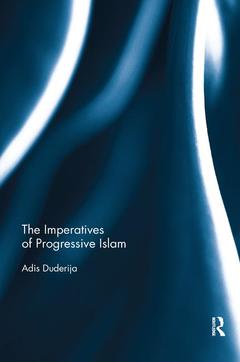The Imperatives of Progressive Islam
Auteur : Duderija Adis

With the proliferation of transnational Muslim networks over the last two decades, the religious authority of traditionally educated Muslim scholars, the uluma, has come under increasing scrutiny and disruption. These networks have provided a public space for multiple perspectives on Islam to be voiced, allowing "progressive" Islamic worldviews to flourish alongside more (neo)traditional outlooks.
This book brings together the scholarship of leading progressive Muslim scholars, incorporating issues pertaining to politics, jurisprudence, ethics, theology, epistemology, gender and hermeneutics in the Islamic tradition. It provides a comprehensive discussion of the normative imperatives behind a progressive Muslim thought, as well as outlining its various values and aims.
Presenting this emerging and distinctive school of Islamic thought in an engaging and scholarly manner, this is essential reading for any academic interested in contemporary religious thought and the development of modern Islam.
Foreword by Ebrahim Moosa
Introduction
1 The Poiesis/Creativity Imperative
2 The Epistemological Imperative
3 The Imperative of Ethics of Pluralism
4 The Imperative of Islamic Liberation Theology
5 The Search for the Ethical Imperative in Islamic Jurisprudence/Law
6 The Gender-Justice Imperative
7 The Imperative of non-Patriarchal Islamic hermeneutics
8 The Human Rights Imperative
Conclusion
Adis Duderija is Lecturer, Study of Islam and Society, Griffith University, Australia. His research focuses on Islamic, interfaith and gender issues.
Date de parution : 08-2018
15.6x23.4 cm
Date de parution : 02-2017
15.6x23.4 cm
Thème de The Imperatives of Progressive Islam :
Mots-clés :
Progressive Muslim Scholars; Adis Duderija; Ethico Legal Content; Epistemological; Progressive Muslim Thought; Ethics of Pluralism; Ethico Legal Texts; Gender-Justice; Khaled Abou El Fadl; Human Rights; Progressive Muslim; Islamic Jurisprudence; Islamic Liberation Theology; Ethico Religious Values; Islamic discourses; Farid Esack; Islamic tradition; Modernity Postmodernity Divide; Poiesis; Abdolkarim Soroush; Progressive Islam; Abdulaziz Sachedina; fiqh; Muslim Family Law; hermeneutics; Islamic Hermeneutics; pluralist; puritan-fundamentalists; Islamic Human Rights Scheme; transnational Muslim networks; Vice Versa; ulama; Muslim World; Epistemic Schemes; Abu Zayd; Human Rights Schemes; Islamic Feminism; Hashim Kamali; Negative Pluralism; Authorial Enterprise



